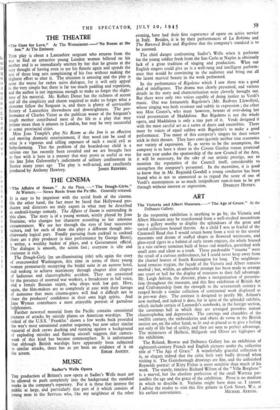THE THEATRE
-The Cure for Love." At The Westminster.---” No Room at the Inn." At The Embassy.
h 1st in
ig
)rt rs it re .11
THIS play is about a Lancashire sergeant who returns from the war to find an attractive young London woman billeted on his mother and is so immediately smitten by her that he groans at the very thought of having even to see his fiancée again and spends the rest of three long acts complaining of his fate without making the slightest effort to alter it. The situation is amusing and the play is none the worse for rather naive dialogue, for it will only appeal to the 'very simple but there is far too much padding and repetition, and the author is not ingenious enough to make us forget the slight- ness of his material. Mr. Robert Donat has the richness of accent to and all the simplicity and charm required to make us forget what a tiresome fellow the Sergeant is, and there is plenty of serviceable flattery of Lancashire shrewdness and downrightness. The per- formance of Charles Victor as the publican wooer of the Sergeant's tough mother contributed most of the life to a play that may irritate more than it amuses in London, but may be very successful is some provincial cities.
Miss Joan Temple's play No Room at the Inn is an effective
al and moving dramatic entertainment, if that word can be used of n what is a vigorous and telling exposure of such a social evil as baby-farming. That the problem of the boarded-out child is a serious one has recently been revealed and we are brought face to face with it here in a manner that may prove as useful as was the late John Galsworthy's indictment of solitary confinement in 7ustice many years ago The play is well-acted, and excellently )f )1.
h It


























 Previous page
Previous page